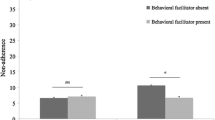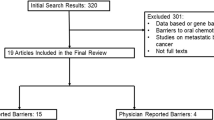Abstract
Background/aims
Adjuvant endocrine therapy for at least 5 years improves oncological outcomes in oestrogen receptor-positive breast cancer. Adherence rates to prescribed endocrine therapy are low and the search for modifiable causes of this continues. The aim of this study was to assess adherence rates in an Irish cohort of breast cancer patients prescribed adjuvant endocrine therapy and to assess modifiable factors associated with suboptimal adherence.
Methods
A cross-sectional anonymous survey was performed on 261 patients currently prescribed endocrine therapy. Data were collected regarding demographics, treatment, social and emotional factors and medication side effects. Each patient completed a medication adherence score and provided information about discontinuation of therapy and reasons for same.
Results
Only 67.8 % of patients assessed demonstrated complete medication adherence on the medication adherence scale. Twenty-nine patients (10.9 %) permanently stopped taking their prescribed endocrine therapy. Suboptimal adherence was more likely in younger patients (p < 0.001), those in employment (p = 0.005), those who experienced side effects (p = 0.006), those who perceived themselves to have low levels of emotional support (p < 0.001) and those who use the internet to read about their illness (p = 0.003).
Conclusions
Endocrine therapy adherence is suboptimal in almost one-third of patients in our cohort. Appropriate assessment and management of side effects and negative emotions, combined with direction of patients to accurate internet sources of information, could help improve endocrine therapy adherence in women with early-stage breast cancer.



Similar content being viewed by others

References
Early Breast Cancer Trialists’ Collabroative Group (1998) Tamoxifen for early breast cancer: an overview of the randomised trials. Lancet 351(9114):1451
Davies C, Pan H, Godwin J et al (2013) Long-term effects of continuing adjuvant tamoxifen to 10 years versus stopping at 5 years after diagnosis of oestrogen receptor-positive breast cancer: ATLAS, a randomised trial. Lancet 381(9869):805
Gray R, Rea D, Handley K et al (2013) aTTom: Long term effects of continuing adjuvant tamoxifen to 10 years versus stopping at 5 years in 6593 women with early breast cancer. J Clin Oncol 31(suppl):abstr5
Allred DC, Anderson SJ, Paik S et al (2012) Adjuvant tamoxifen reduces subsequent breast cancer in women with estrogen receptor-positive ductal carcinoma in situ: a study based on NSABP protocol B-24. J Clin Oncol 30(12):1268–1273
Santen RJ, Santner S, Davis B et al (1978) Aminoglutethimide inhibits extraglandular estrogen production in postmenopausal women with breast carcinoma. J Clin Endocrinol Metab 47:1257–1265
Jonat W, Howell A, Blomqvist C et al (1996) A randomised trial comparing two doses of the new selective aromatase inhibitor (“Arimidex”) with megestrol acetate in postmenopausal women with advanced breast cancer. Eur J Cancer 32A:404–412
Buzdar AU, Jones SE, Vogel CL et al; The Arimidex Study Group (1997) A Phase III trial comparing anastrozole (1 and 10mg), a potent and selective aromatase inhibitor, with megestrol acetate in postmenopausal women with advanced breast cancer. Cancer (Phila.) 79:730–739
Howell A, Cuzick J, Baum M et al (2005) Results of the ATAC (Arimidex, Tamoxifen, Alone or in Combination) trial after completion of 5 years’ adjuvant treatment for breast cancer. Lancet 365(9453):60
Mamounas E, Lembersky B, Jeong JH et al (2006) NSABP B-42: a clinical trial to determine the efficacy of five years of letrozole compared with placebo in patients completing five years of hormonal therapy consisting of an aromatase inhibitor (AI) or tamoxifen followed by an AI in prolonging disease-free survival in postmenopausal women with hormone receptor-positive breast cancer. Clin Breast Cancer 7(5):416
Barron T, Cahir C, Sharp L, Bennett K (2013) A nested case-control study of adjuvant hormonal therapy persistence and compliance and early breast cancer recurrence in women with stage I–III breast cancer. Br J Cancer 109:1513
Chlebowski RT, Geller ML (2006) Adherence to endocrine therapy for breast cancer. Oncology 71(1–2):1
Stanton AL, Petrie KJ, Partridge AH (2014) Contributors to non-adherence and non-persistence with endocrine therapy in breast cancer survivors recruited from an online research registry. Breast Cancer Res Treat 145(2):525
Simon R, Latreille J, Matte C, Desjardins P, Bergeron E (2013) Adherence to adjuvant endocrine therapy in estrogen receptor-positive breast cancer patients with regular follow-up. Can J Surg 57(1):26
Jacob Arriola KR, Mason TA, Bannon KA et al (2014) Modifiable risk factors for adherence to aduvant endcorine therapy among breast cancer patients. Patient Educ Couns 95(1):98
Danilak M, Chambers CR (2013) Adherence to adjuvant endocrine therapy in women with breast cancer. J Oncol Pharm Pract 19(2):105
Cluze C, Rey D, Huiart L et al (2012) Adjuvant endocrine therapy with tamoxifen in young women with breast cancer, determinants of interruptions vary over time. Ann Oncol 23(4):82
Bender CM, Gentry AL, Brufsky AM et al (2014) Influence of patient and treatment factors on adherence to adjuvant endocrine therapy in breast cancer. Oncol Nurs Forum 41(3):274
Albert US, Zemlin C, Hadji P et al (2011) The impact of breast care nurses on patients’ satisfaction, understanding of the disease and adherence to adjuvant endocrine therapy. Breast Care (Basel) 6(3):221
Cuzick J, Sestak I, Forbes JF et al (2014) Anastrozole for prevention of breast cancer in high-risk postmenopausal women (IBIS-II): an international, double-blind, randomised placebo-controlled trial. Lancet 383(9922):1041–1048
Morisky DE, Green LW, Levine DM (1986) Concurrent and predictive validity of a self-reported measure of medication adherence. Med Care 24(1):67
Ziller V, Kyvernitakis I, Knoll D, Storch A, Hards O, Hadji P et al (2013) Influence of a patient information program on adherence and persistence with an aromatase inhibitor in breast cancer treatment—the COMPAS study. BMC Cancer 13:407
Aiello Bowles EJ, Boudreau DM, Chubak J et al (2012) Patient-reported discontinuation of endocrine therapy and related adverse effects among women with early stage breast cancer. J Oncol Pract 8(6):e149
Markkula A, Hietala M, Henningson M et al (2012) Clinical profiles predict early non-adherence to adjuvant endocrine treatment in a prospective breast cancer cohort. Cancer Prev Res (Phula) 5(5):735
Guth U, Myrick ME, Kilic N, Eppenberger-Castori S, Schmid SM et al (2012) Compliance and persistence of endocrine adjuvant breast cancer therapy. Breast Cancer Res Treat 131(2):491
Dittmer C, Roeder K, Hoellen F et al (2011) Compliance to adjuvant therapy in breast cancer patients. Eur J Gynaecol Oncol 32(3):280
Barron TI, Connolly R, Bennett K, Feely J, Kennedy MJ (2007) Early discontinuation of tamoxifen. A lesson for oncologists. Cancer 109(5):832
Makubate B, Donnan PT, Dewar JA, Thompson AM, McCowan C (2013) Cohort study of adherence to adjuvant endocrine therapy, breast cancer recurrence and mortality. Br J Cancer 108(7):1515
Font R, Espinas JA, Gil-Gil M et al (2012) Prescription refill, patient self report and physician report in assessing adherence to oral endocrine therapy in early breast cancer patients: a retrospective cohort study in Catalonia, Spain. Br J Cancer 107(8):1249
Guth U, Huang DJ, Schotzau A et al (2008) Target and reality of adjuvant endocrine therapy in postmenopausal patients with invasive breast cancer. Br J Cancer 99(3):428
Hershman DL, Kushi LH, Shao T et al (2010) Early discontinuation and non-adherence to adjuvant hormonal therapy in a cohort of 8,769 early-stage breast cancer patients. J Clin Oncol 28(27):4120
Visram H, Kanji F, Dent SF (2010) Endocrine therapy for male breast cancer: rates of toxicity and adherence. Curr Oncol 17(5):17
Xu S, Yang Y, Tao W et al (2012) Tamoxifen adherence and its relationship to mortality in 116 men with breast cancer. Breast Cancer Res treat 136:495
Weaver KE, Camacho F, Hwang W, Anderson R, Kimmick G et al (2013) Adherence to adjuvant hormonal therapy and it relationship to breast cancer recurrence and survival among low income women. Am J Clin Oncol 36(2):181
Carlson JJ, Roth JA (2013) The impact of the oncotype DX breast cancer assay in clinical practice: a systematic review and meta-analysis. Breast Cancer Res Treat 141(1):13–22
SWOG S1007 Trial. www.clinicaltrialsregister.eu/ctr-search/search?query=2012-000576-42. Accessed 4 July 2014
Guiliano AE, Hunt KK, Ballman KV et al (2011) Axillary dissection vs no axillary dissection in women with invasive breast cancer and sentinel node metastasis: a randomized clinical trial. JAMA 305(6):569
Sert F, Ozsaran Z, Eser E et al (2013) Quality of life assessment in women with breast cancer: a prospective study including hormonal therapy. J Breast Cancer 16(2):220
Ediger JP, Walker JR, Graff L et al (2007) Predictors of Medication adherence in inflammatory bowel disease. Am J Gastroenterol 102:1417
Kiley DJ, Lam CS, Pollak R (1993) A study of treatment compliance following kidney transplantation. Transplantation 55(1):51–56
Henry NL, Azzouz F, Desta Z et al (2012) Predictors of aromatase inhibitor discontinuation as a result of treatment-emergent symptoms in early breast cancer. J Clin Oncol 30(9):936
Wouters H, Maatman GA, Van Dijk L et al (2013) Trade off preferences regarding adjuvant endocrine therapy among women with estrogen receptor positive breast cancer. Ann Oncol 24(9):2324
Cuzick J, Sestak I, Cella D et al (2008) Treatment-emergent endocrine symptoms and the risk of breast cancer recurrence: a retrospective analysis of the ATAC trial. Lancet Oncol 9(12):1143
Van de Poll-Franse LV, van Eenbergen MC (2008) Internet use by cancer survivors: current use and future wishes. Support Care Cancer 16(10):1189e95
Castleton K, Fong T, Wang-Gillam A et al (2011) A survey of internet utilization among patients with cancer. Support Care Cancer 19(8):1183–1190
McHugh SM, Corrigan M, Morney N et al (2011) A quantitative assessment of changing trends in internet usage for cancer information. World J Surg 35(2):253
Quinn EM, Corrigan M, McHugh SM et al (2012) Breast cancer information on the internet: analysis of accessibility and accuracy. Breast 21(4):514
Neven P, Markopoulos C, Tanner M et al (2014) The impact of educational materials on compliance and persistence rates with adjuvant aromatase inhibitor treatment: first-year results from the compliance of aromatase inhibitors assessment in daily practice through educational approach (CARIATIDE) study. Breast [Epub ahead of print]
Hadji P, Blettenr M, Harbeck N et al (2013) The patient’s anastrazole compliance to therapy (PACT) program: a randomized, in-practice study on the impact of a standardized information programme on persistence and compliance to adjuvant endocrine therapy in postmenopausal women with early breast cancer. Ann Oncol 24(6):1505
von Blanckenburg P, Schuricht F, Albert US, Rief W, Nestoriuc Y et al (2013) Optimizing expectations to prevent side effects and enhance quality of life in breast cancer patients undergoing endocrine therapy: study protocol of a randomized controlled trial. BMC Cancer 18(13):426
Southwest Oncology Group. S1105: text-messaging intervention to reduce early discontinuation of AI therapy in women with early-stage breast cancer. NCT01515800. http://clinicaltrials.gov/show/NCT01515800. Accessed 13 Nov 2014
Wang P, Benner J, Glynn R et al (2004) How well do patients report noncompliance with antihypertensive medications?: a comparison of self-report versus filled prescriptions. Pharmacoepidemiol Drug Saf 13(1):11–19
Garber M, Nau D, Erickson S, Aikens J, Lawrence J (2004) The concordance of self-report with other measures of medication adherence: a summary of the literature. Med Care 42(7):649–652
Acknowledgments
The authors received no funding for this study.
Conflict of interest
The authors declare no conflicts of interest.
Ethical approval
Ethics approval for the study was obtained from the Ethics Committee of the Cork Teaching Hospitals and each patient provided written informed consent.
Author information
Authors and Affiliations
Corresponding author
Rights and permissions
About this article
Cite this article
Quinn, E.M., Fleming, C. & O’Sullivan, M.J. Endocrine therapy adherence: a cross-sectional study of factors affecting adherence and discontinuation of therapy. Ir J Med Sci 185, 383–392 (2016). https://doi.org/10.1007/s11845-015-1307-4
Received:
Accepted:
Published:
Issue Date:
DOI: https://doi.org/10.1007/s11845-015-1307-4



